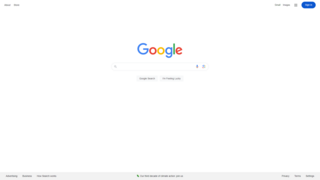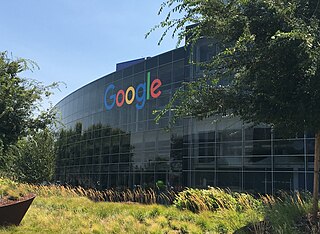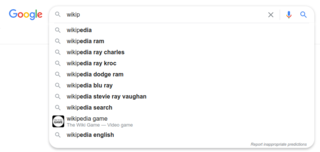Google is an American multinational corporation specializing in internet-related services and products.
Contents
Google, Googal, or Googol may also refer to:
Google is an American multinational corporation specializing in internet-related services and products.
Google, Googal, or Googol may also refer to:

Google Search is a search engine operated by Google. It allows users to search for information on the Internet by entering keywords or phrases. Google Search uses algorithms to analyze and rank websites based on their relevance to the search query. It is the most popular search engine worldwide.

Lawrence Edward Page is an American businessman, computer scientist and internet entrepreneur best known for co-founding Google with Sergey Brin.
Search engine optimization (SEO) is the process of improving the quality and quantity of website traffic to a website or a web page from search engines. SEO targets unpaid traffic rather than direct traffic or paid traffic. Unpaid traffic may originate from different kinds of searches, including image search, video search, academic search, news search, and industry-specific vertical search engines.
A penguin is a flightless bird from the Southern Hemisphere.
Google Toolbar was a web browser toolbar for Internet Explorer, developed by Google. It was first released in 2000 for Internet Explorer 5. Google Toolbar was also distributed as a Mozilla plug-in for Firefox from September 2005 to June 2011. On December 12, 2021, the software was no longer available for download, and the website now redirects to a support page.
Chrome may refer to:

Google LLC is an American multinational corporation and technology company focusing on online advertising, search engine technology, cloud computing, computer software, quantum computing, e-commerce, consumer electronics, and artificial intelligence (AI). It has been referred to as "the most powerful company in the world" and as one of the world's most valuable brands due to its market dominance, data collection, and technological advantages in the field of AI. Google's parent company Alphabet Inc. is one of the five Big Tech companies, alongside Amazon, Apple, Meta, and Microsoft.
A robot is a virtual or mechanical artificial agent, usually an electro-mechanical machine.
An aria is a self-contained expressive melody for one voice usually with orchestral accompaniment.

Baidu, Inc. is a Chinese multinational technology company specializing in Internet-related services, products, and artificial intelligence (AI), headquartered in Beijing's Haidian District. It is one of the largest AI and Internet companies in the world. The holding company of the group is incorporated in the Cayman Islands. Baidu was incorporated in January 2000 by Robin Li and Eric Xu. Baidu has origins in RankDex, an earlier search engine developed by Robin Li in 1996, before he founded Baidu in 2000.
Local search is the use of specialized Internet search engines that allow users to submit geographically constrained searches against a structured database of local business listings. Typical local search queries include not only information about "what" the site visitor is searching for but also "where" information, such as a street address, city name, postal code, or geographic coordinates like latitude and longitude. Examples of local searches include "Hong Kong hotels", "Manhattan restaurants", and "Dublin car rental". Local searches exhibit explicit or implicit local intent. A search that includes a location modifier, such as "Bellevue, WA" or "14th arrondissement", is an explicit local search. A search that references a product or service that is typically consumed locally, such as "restaurant" or "nail salon", is an implicit local search.
An SEO contest is a prize activity that challenges search engine optimization (SEO) practitioners to achieve high ranking under major search engines such as Google, Yahoo, and MSN using certain keyword(s). This type of contest is controversial because it often leads to massive amounts of link spamming as participants try to boost the rankings of their pages by any means available. The SEO competitors hold the activity without the promotion of a product or service in mind, or they may organize a contest in order to market something on the Internet. Participants can showcase their skills and potentially discover and share new techniques for promoting websites.

A search engine is a software system that provides hyperlinks to web pages and other relevant information on the Web in response to a user's query. The user inputs a query within a web browser or a mobile app, and the search results are often a list of hyperlinks, accompanied by textual summaries and images. Users also have the option of limiting the search to a specific type of results, such as images, videos, or news.
Google was officially launched in 1998 by Larry Page and Sergey Brin to market Google Search, which has become the most used web-based search engine. Larry Page and Sergey Brin, students at Stanford University in California, developed a search algorithm first (1996) known as "BackRub", with the help of Scott Hassan and Alan Steremberg. The search engine soon proved successful and the expanding company moved several times, finally settling at Mountain View in 2003. This marked a phase of rapid growth, with the company making its initial public offering in 2004 and quickly becoming one of the world's largest media companies. The company launched Google News in 2002, Gmail in 2004, Google Maps in 2005, Google Chrome in 2008, and the social network known as Google+ in 2011, in addition to many other products. In 2015, Google became the main subsidiary of the holding company Alphabet Inc.
A googol is the large number 10100. In decimal notation, it is written as the digit 1 followed by one hundred zeroes: 10,

DuckDuckGo is an American software company that offers a number of products intended to help people protect their online privacy. The flagship product is a search engine that has been praised by privacy advocates. Subsequent products include extensions for all major web browsers and a custom DuckDuckGo web browser.
Discoverability is the degree to which something, especially a piece of content or information, can be found in a search of a file, database, or other information system. Discoverability is a concern in library and information science, many aspects of digital media, software and web development, and in marketing, since products and services cannot be used if people cannot find it or do not understand what it can be used for.
Personalized search is a web search tailored specifically to an individual's interests by incorporating information about the individual beyond the specific query provided. There are two general approaches to personalizing search results, involving modifying the user's query and re-ranking search results.

Search engine cache is a cache of web pages that shows the page as it was when it was indexed by a web crawler. Cached versions of web pages can be used to view the contents of a page when the live version cannot be reached, has been altered or taken down.